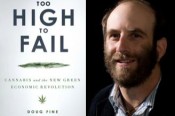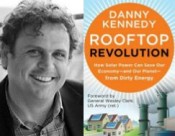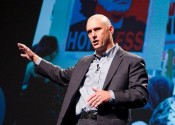Free Forum Q&A – MARCIA COYLE, Author of THE ROBERTS COURT: Struggle for the Constitution
Written on July 9th, 2013 |
Aired: 07/07/13
A friend tells the story of striking up a conversation with a hip looking man in his late 20s-early 30s in a movie line on the west side of LA shortly before the 2004 election between George Bush and John Kerry. He asked the young man who he planned to vote for, he answered that he hadn’t made up his mind. My friend said to him, “Two words. Supreme Court.” To which the young man replied, “Oh, are we voting for them too?”
While we may be disappointed in his apparent lack of civics knowledge, in his own way, he spoke the truth. The most lasting actions a president takes may be his appointments to the Supreme Court. Supreme Court justices serve for as long as they wish or as long as they are able. Their decisions very often set precedents that can live forever. Bush had appointed John Roberts Chief Justice in his first term, but according to today’s guest, it was his second term appointment of Samuel Alito to replace Sandra Day O’Connor that really solidified the Roberts Court.
O’Connor had been a much more moderate conservative than Alito has proven to be. The center of the court shifted to the right, which may matter little in decisions with large majorities – more than 50% of cases each term are decided unanimously or by 8-1 or 7-2 votes — but can be crucial in decisions decide 5-4.
MARCIA COYLE has chosen to focus her book THE ROBERTS COURT: The Struggle for the Constitution on four such 5-4 decisions – Citizens United on campaign finance; District of Columbia v Heller on gun control; on race in school choice; and on the constitutionality of the Affordable Care Act.
Q&A w/ DOUG FINE, Author of TOO HIGH TO FAIL: Cannabis and the New Green Economic Revolution
Written on June 25th, 2013 |
Aired: 06/23/13
This week, in the second of a two-part series (Part One with CARL HART, author of HIGH PRICE: A Neuroscientist’s Journey of Self-Discovery that Challenges Everything You Know about Drugs and Society) I’m joined by DOUG FINE to talk about the accelerating movement to change the rules on marijuana. According to Fine, as the economy continues to limp along for most Americans and California cities declare bankruptcy, one action — the legalization of marijuana — would save government billions per year while raising huge sums in taxes. According to TIME, the legal medicinal cannabis economy already generates $200 million annually in taxable proceeds from a mere five hundred thousand registered medical users in just sixteen states. 51% of Americans support full legalization (cannabis regulated for adults like alcohol), and 80% support medicinal cannabis legalization.
Fine’s book, TOO HIGH TO FAIL: Cannabis and the New Green Economic Revolution, is just out in paperback. In a postscript added to the new edition, Fine writes,” On November 6, 2012, Colorado and Washington voters ended the Drug War. That is to say, voters in both states overwhelmingly legalized adult social use of cannabis (Colorado’s new law, vitally, also allows industrial cannabis cultivation). It is no stretch to say that the Berlin Wall of the Drug War fell.” We’ll talk about how quickly the landscape is changing and look ahead to the era of legal marijuana.
Q&A w/ DANNY KENNEDY, ROOFTOP REVOLUTION: How Solar Power Can Save Our Economy and the Planet from Dirty Energy
Written on May 13th, 2013 |
Aired: 05/12/13
Is there a revolution coming to your rooftop? While opponents claim solar is expensive, inefficient, and unreliable, in his book ROOFTOP REVOLUTION: How Solar Power Can Save Our Economy And Our Planet From Dirty Energy, DANNY KENNEDY makes clear solar can save money, create jobs, and protect the environment if only politics and perception will get out of the way.
During the recent Presidential campaign, we heard a lot about Solyndra, the solar start-up that received a sizable government loan only to go belly up. Solar’s detractors claim the collapse of Solyndra proves solar is just a hippie pipe dream, but Danny Kennedy, says the truth is quite the opposite. Solyndra failed because it wasn’t able to compete in a red-hot industry, not because solar isn’t ready for prime time.
The industry employs 100,000 people in the United States, twice as many as in 2009 and twice the number of coal miners. In 2011, Warren Buffett invested $2 billion in a solar farm, and General Electric bought a start-up solar manufacturer, announcing, “By 2020 this is going to be at least a $1 billion product line.” Production of solar-generated electricity rose by 45% in the first three quarters of 2010, while electricity from natural gas rose only 1.6% and coal declined by 4.2%. Kennedy argues for a rooftop revolution to break the entrenched power of the coal, oil, nuclear, and natural gas industries and their progress-denying allies.
www.rooftoprevolutionbook.com
www.sungevity.com
Q&A: Mark Mykleby, Natl Security=Sustainability
Written on April 8th, 2013 |
Aired: 04/07/13
In the preface to an article entitled A National Strategic Narrative, Anne-Marie Slaughter of Princeton says we need a narrative that confronts some of the following questions, “Where is the United States going in the world? How can we get there? What are the guiding stars that will illuminate the path along the way? We need a story with a beginning, middle, and projected happy ending that will transcend our political divisions, orient us as a nation, and give us both a common direction and the confidence and commitment to get to our destination.” She also writes, “In one sentence, the strategic narrative of the United States in the 21st century is that we want to become the strongest competitor and most influential player in a deeply inter-connected global system, which requires that we invest less in defense and more in sustainable prosperity and the tools of effective global engagement.”
Over time, the best way to shape the force of the future is to invest in the science, technology, education, and training that will equip our soldiers, sailors, airmen, and marines to adapt to an increasingly complex and dynamic environment. The hardware and software we buy and build are secondary to the gray matter we must cultivate now.
When I hear that someone high up in the military is talking seriously about sustainability, I take notice.
www.newamerica.net
Q&A: MICHAEL LIND, Co-founder of the New America Foundation; Author of LAND OF PROMISE: An Economic History of the United States
Written on March 17th, 2013 |
Aired: 03/17/13
This week’s guest, MICHAEL LIND, has written an economic history of the United States. In his new book, LAND OF PROMISE, he lays out a pattern in which the US has reinvented itself economically and politically a number of times based on the emergence of new technologies. From wind and water, to steam, to electricity and internal combustion, and finally the computer.
Each new dominant technology overwhelms the existing political and regulatory system and American government lags a generation or two behind technology-induced economic change. It takes a crisis or a war or both to overthrow the old regime and usher in the new.
When the U.S. economy has flourished, Lind argues, government, business, labor and universities have worked together as partners in a project of economic nation building. Today, as the United States struggles to emerge from the Great Recession, Land of Promise says that Americans, since the earliest days of the republic, have repeatedly reinvented the American economy-and have the power to do so again.
